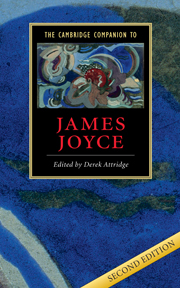Book contents
- Frontmatter
- 1 Reading Joyce
- 2 Joyce the Irishman
- 3 Joyce the Parisian
- 4 Joyce the modernist
- 5 Dubliners
- 6 Stephen Hero and A Portrait of the Artist as a Young Man
- 7 Ulysses
- 8 Finnegans Wake
- 9 Joyce’s shorter works
- 10 Joyce and feminism
- 11 Joyce and sexuality
- 12 Joyce and consumer culture
- 13 Joyce, colonialism, and nationalism
- Further reading
- Index
- Series List
11 - Joyce and sexuality
Published online by Cambridge University Press: 28 May 2006
- Frontmatter
- 1 Reading Joyce
- 2 Joyce the Irishman
- 3 Joyce the Parisian
- 4 Joyce the modernist
- 5 Dubliners
- 6 Stephen Hero and A Portrait of the Artist as a Young Man
- 7 Ulysses
- 8 Finnegans Wake
- 9 Joyce’s shorter works
- 10 Joyce and feminism
- 11 Joyce and sexuality
- 12 Joyce and consumer culture
- 13 Joyce, colonialism, and nationalism
- Further reading
- Index
- Series List
Summary
The early life and career of James Joyce unfolded during a turbulent period in the history of sexuality in the United Kingdom. A cluster of sometimes competing cultural and scientific discourses emerged to catalogue, diagnose, and explain a broad spectrum of human sexual expression. At the same time, a series of explosive events (the Dublin Castle Affair, the Cleveland Street Scandal, the trials of Oscar Wilde, the rise of the New Woman) turned certain less approved elements of that spectrum into matters of mass spectacle and contention. A fundamental if contradictory mutation in the enlightened sexual attitudes of the time occurred in response to these developments. There was an increased awareness of the irrepressible varieties in sexual practices and preferences among individuals and across cultures. But there also arose a closely related desire to limit such variation, manifest in a concerted effort to establish traditional standards of sexual practice as interiorized norms of sexual desire and identity. With its long-standing cultural privilege newly enhanced by its importance to nation and empire building, reproductive heterosexuality became a truly 'compulsory' touchstone in this regard: other erotic modalities were not only treated as deviations from but distorted replicas of this libidinal regime. To take the most salient example, the widely accepted 'inversion' model of homosexuality - the notion of a woman's soul trapped in a man's body or vice versa - referred all same-sex desire not to the bodily sex of its bearer, but to the 'opposite' gender of the mind, thereby framing it as cross-sex desire at a remove.
- Type
- Chapter
- Information
- The Cambridge Companion to James Joyce , pp. 213 - 233Publisher: Cambridge University PressPrint publication year: 2004
- 1
- Cited by



